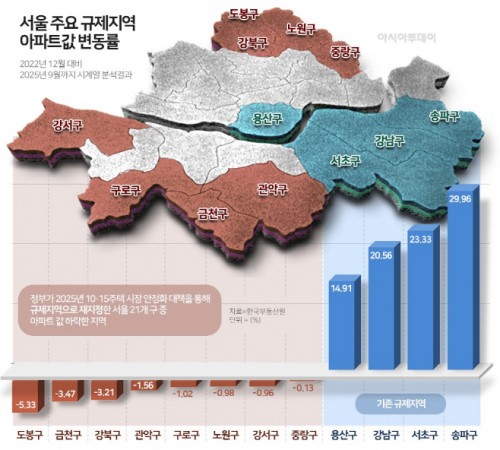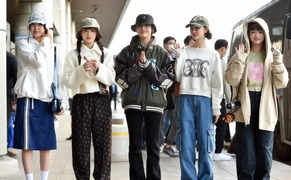 |
| A chart shows apartment-price changes in major regulated districts across Seoul. / Source: Korea Real Estate Board; Graphic by Park Jong-kyu. |
Residents on the outskirts of Seoul are pushing back after the government’s Oct. 15 housing measures designated all of Seoul and 12 areas in Gyeonggi Province as regulated zones, even in districts where apartment prices have fallen over the past three years.
Officials say the sweeping designations are meant to head off “balloon effects” that push price gains from one area to another. But critics argue the government applied the rules in a rigid, one-size-fits-all manner that ignores local market conditions.
An analysis of Korea Real Estate Board (REB) time-series data on Oct. 16 showed that, from December 2022 through last month, apartment prices in Seoul’s Dobong District fell 5.33%.
Price declines were also recorded in Geumcheon (-3.47%), Gangbuk (-3.21%), Gwanak (-1.56%), Guro (-1.02%), Nowon (-0.98%), Gangseo (-0.96%) and Jungnang (-0.13%).
Despite those drops, these districts were newly designated as both “overheated speculation zones” and “adjustment target areas.” As a result, the loan-to-value (LTV) cap for first-time buyers (including those selling an existing home) will fall from 70% to 40%, while owners of at least one home will be barred from taking out new mortgages. Acquisition taxes will also rise to 8% for owners of two homes and 12% for those with three or more, sharply tightening financing and tax rules across the board.
Starting Oct. 20, these districts will face “triple regulation,” as many are also being folded into land-transaction permit zones. Buyers will be required to live in the home for two years, and lease-arbitrage “gap investing” will be effectively prohibited.
A similar split has emerged across Gyeonggi Province.
Of the 12 Gyeonggi areas newly regulated, seven—Suwon’s Yeongtong, Jangan and Paldal; Seongnam’s Jungwon; Anyang’s Dongan; Yongin’s Suji; and Uiwang—were actually removed from regulation in November 2022. Yet REB figures show that, from October 2022 to last month, all seven saw apartment prices decline.
Uiwang posted the steepest drop (-14.93%), followed by Suwon Jangan (-9.18%), Suwon Paldal (-8.72%), Seongnam Jungwon (-8.71%), Suwon Yeongtong (-8.55%), Anyang Dongan (-6.50%) and Yongin Suji (-4.94%).
Among would-be buyers, frustration is mounting: “When prices in the three Gangnam districts were jumping by billions of won, the government did nothing. Now that outer districts are just starting to show signs of rising, they slap on new curbs,” one complaint goes.
Most Read
-
1
-
2
-
3
-
4
-
5
-
6
-
7





















